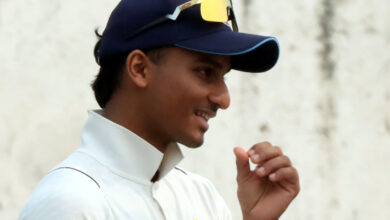At end of bitter-sweet year, Pat Cummins on verge of entering pantheon of great Australia captains | Cricket-world-cup News

Pat Cummins paused and took a long deep breath. He was asked about the frenetic year that was 2023. He fingers tapped the microphone, the broad features of his face went tighter, as though he would produce an evoking monologue. But he would deflate the gravity and significance of the year in platitudes like “it has been a huge year,” or that the one constant in the team “has been the morale in the year.” The usual skipper-speak.But 2023 was no ordinary year for him; it was several years rolled into one, a year that both broke and remade him.
It was a year he plunged the depths of sorrow and scaled the peaks of joy, a year his world fell apart but also the one he rebuilt, displaying immense courage and resilience through tough times and showing impeccable grace in good times. It was the year he lost his mother, forcing him to leave his colleagues midway through a Test tour in India. It was the year his captaincy faced the sternest of tests. A year that was bitter and sweet at the same time.
Follow all the action from the Cricket World Cup 2023 on our special World Cup section. You can also find the latest stats, like the top scorer and the highest wicket-taker of the current edition, upcoming World Cup fixtures and the points table on the site.
Even before the year began, it was supposed to be the sternest year of both Cummins the captain and Cummins the bowler, both twains inseparably intertwined. In the backdrop was playing the illness of his mother, the responsibilities of a young father. His unreal composure was facing its stiffest reality check. Just three months into 2023, he lost his mother. Just when he was recovering from the loss, he would hear the pundits ripping his captaincy apart. In his absence, Steve Smith would lead the team to a rare victory in a Test match in India and a draw. Cummins-criticisms intensified; Smith-sympathy intensified.
But Cummins did not wither in the storm. He barely uttered a word in angst or sprung a staunch defense of himself. Such banal responses are not in his nature. The actions, and not words, would speak louder.
Four months later, he would win the World Test Championship, two months on, he would retain the urn, define the games with bat and ball. In Birmingham, he grabbed four wickets and scored 38 and 44 not out, the latter orchestrating a two-wicket he. Still, the critics would hound, censuring him for squandering a 2-0 advantage and missing the chance to win a series in England for the second time this century.
Dignified giant
His serenity was misconstrued as a lack of fire, his dignity an antithesis of the fabled Aussie ruggedness, his diminished numbers in Ashes misinterpreted as a sign of captaincy burdening him. Holes too were found in his demeanor. He smiled too often, he fired no salvos, he waged no war. He broke the archetype of an Australian captain as a throbbing Alpha Male specimen.
Yet, he retained the Ashes, which Ricky Ponting and Michael Clarke had failed to in England; he held aloft the World Test Championship mace, the first Australian captain to. And now, he has taken his team to the World Cup final. Perhaps, of all the tournaments, this has been Cummins’s most influential one, his coup de grace, paradoxically coming in a format whose soul he admitted he had not conquered. The stats-board reveals precious little. All he has in 10 games is 13 wickets at 37, an economy rate of 6.05; 128 runs at a strike rate of 68. He did admit that captaincy was affecting his bowling and sometimes decision-making, but did not wear a mask of false bravado.
But Australia’s revival in the World Cup began with Cummins. After two defeats and a horrific start against Sri Lanka, his spell was to change the game. From 125 for no loss, he took out the openers, and Sri Lanka crumbled to 209 all out.
In the direst of moments, Cummins descended from nowhere, a superhero without pretending to be one. Against New Zealand, he cracked 37 off 14 and removed centurion Rachin Ravindra in a game Australia won five runs; versus Afghanan his 68-ball 12 not out was a second-fiddle masterclass, his 14 off 29 balls against South Africa in the semifinals was as significant.
Beauty of a catch
Earlier that game, he had set the tone with the backpedaling devil of a catch to devour Quinton de Kock. The inscrutable face of peace slipped — he celebrated as hysterically as you would ever see him. He was the emperor of little moments, and on those little moments have Australia reached where they are now, an unanticipated run to the finals, a shot at being held in as much awe as Steve Waugh and Ricky Ponting, Allan Border and Michael Clarke.Most Read
1
Fans request Amitabh Bachchan not to watch India vs Australia ICC World Cup 2023 final, actor says ‘I am thinking…’
2
Sharjah court rejects plea Mumbai DJ facing 25-year jail
See More
He was reminded of Waugh and Ponting, but hiding the boyish enthusiasm bubbling inside him, he said: “We were all kids not too long ago, watching some of those great teams win the 99, 2003, 2007 World Cups. That’s the opportunity ahead of us tomorrow, which is really exciting. To be captain would be an absolute privilege to lift the trophy with these great bunch of blokes.” Here thus is a captain not crushed the burden of the past, not overawed the sparkling present, not bothered about the uncertain future.
All he perhaps needs is a defining performance, as Waugh (the hundred against South Africa in Super Six) and Ponting (hundred in the final). There perhaps is no bigger stage than the final, but even if he does not, he has already defined the tournament, shaped it with little precious moments. Take those away, and Australia would have long fallen apart.In a way, this has been the year of Cummins in Australian cricket.
Whether or not he adds a World Cup to the l of achievements, he would not forget 2023. The year that broke and remade him, several years rolled into one, a year that was both sweet and bitter.







